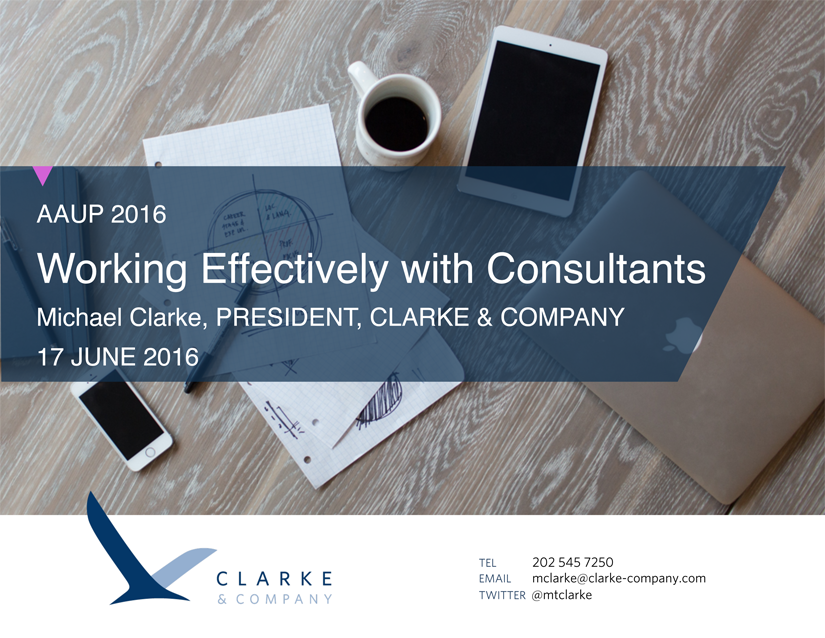
Who better to discuss how to work effectively with consultant than (wait for it)… a consultant? Yes, advice on getting advice – we have gone meta here at the Scholarly Kitchen.
I was asked to present at and moderate a panel on this topic at the AAUP annual meeting back in June. Actually, my colleague Pam Harley was asked to present and moderate a panel on this topic but then had a schedule conflict come up and so I was asked to fill in and present her slides. Which is the best kind of presentation – the kind where someone else puts together your slides (especially when that person is Pam).
We have had a steady trickle of requests for the slides since the meeting which may be indicative of wider interest in this topic and so I thought we would test that hypothesis (and save time replying to requests) by posting them here (there is a little peek into the consulting mind in action).
The other panelists included Linda Cameron, Director, University of Alberta Press; Raym Crow, Managing Partner Partner, Chain Bridge Group; and Darrin Pratt, Director, University Press of Colorado and a lively discussion followed. There were some great case studies from the two university press directors, many words of wisdom from Raym Crow, and a lot of audience participation. The most notable part of the discussion to my mind was talking about how to hire consultants – or more precisely, how not to hire consultants. The audience and panelists generally agreed with the proposition put forth in our presentation that a formal request for proposal (RFP) process can lead to less than optimal outcomes unless the deliverables, schedule, scope, and budget are all well defined up front (of course you should always request a proposal from a consultant before working with them – here I mean a competitive process where one simultaneously asks for proposals from multiple sources). This is because the proposals that result from RFPs can be difficult to compare as different consultants will make different assumptions. That said, while there is a danger in not being descriptive enough there is also a danger in issuing an RFP that is too prescriptive. A consultant, for example, might not provide alternative approaches not considered by the client (approaches that may lead to better outcomes) if the RFP is too specific as to methods and processes.
For an example of the different assumptions consultants can make in response to the same RFP, let’s imagine that there is a project to provide a strategic assessment of a publisher’s book program. One consultant may assume that the project will involve numerous visits to the publisher’s offices to interview staff, review documents, and preview findings. It will further involve phone interviews with board members, authors and editors, a competitive benchmarking process, a report that will go through at least two iterations, and a presentation to the organization’s board of directors. This consultant is assuming that the project requires building “buy-in” or consensus and that requires a lot of client interaction (they may assume this because they have just completed a similar engagement with a different client and that client required a lot of interaction). Another consultant may assume they will conduct all interviews by phone and then go off and write a report. They are assuming the main purpose of the engagement is simply to provide information and that it does not require much client interaction (they too might make this assumption because they have just completed a similar engagement with a different client and that client did not require much interaction at all). These are very different approaches and are going to have significantly different fees associated with them – and potentially, very different outcomes. Some of these assumptions may be clearly evident in the proposal, others may not. So a client comparing proposals might think the first consultant is “expensive” or the second consultant seems “cheap.” In fact, they are comparing very different projects. Apples and oranges.
So how do you choose? What if the second consultant has experience that better aligns with the project and a good recommendation from another organization but the first has made assumptions that better align with your budget or your organizational culture? Obviously you negotiate. Or it sounds obvious but during the discussion at AAUP it was noted that many organizations don’t think to negotiate. They simply choose a second or third choice due to price or other factors rather then working with their first choice on refining scope, timeline, methods, or deliverables.
Consulting, it perhaps goes without saying, is a services business. This makes it very different from purchasing things like software that are partially services but partially products. With software, there are certain features and functionality that either do or do not exist already and certain costs for remediating a requirements gap. This is why RFPs tend to be relatively straightforward (I said “relatively” – I can already sense the fingers moving furiously towards the comment button from anyone that has ever managed a software RFP) with software and other types of products (and services that more resemble products). With consulting, there is no product. Different consulting firms have different capabilities and expertise, and it is important to match these capabilities and expertise to the project at hand. But it is not the case that the consultant has already drafted half of your final report or conducted three quarters of your member survey or met with the members of your editorial board who live west of the Mississippi and it is just a matter of filling in a few pieces. A consultant’s services aren’t already engineered or coded (they might have processes and systems that are, however). This is an important difference in working with a consulting proposal. As they have not already performed the services (“sorry our consulting platform doesn’t support meeting with your finance committee”) there is much more flexibility in adjusting them than in other contexts.
So is there an alternative to an RFP for consulting services? An RFI (request for information) is one alternative that can be just as valuable. It helps clients understand who has the right capabilities and experience for a given engagement and can provide some insight into how a consultant might approach a problem. Circulating a project brief (see presentation below) is another alternative to drafting an RFP that can accomplish much the same thing. Word of mouth referrals from other organizations are also good indicators (and don’t be shy about asking consultants for references). Once you find the right consultant via an RFI or referral, then work with the consultant on getting the proposal or statement of work right at the onset through a series of conversations. Consultants can fit projects to budgets, work backwards from deliverables or outcomes, change timetables, or look at alternative methods (consulting is not a product). A good consultant will fit the project to the client.
If you must do an RFP, it is important to recognize that they are imperfect beasts when dealing with services and that the outcome is likely to be a set of very different proposals and that a round or two of revisions and negotiations is likely to be necessary.
Click here or on the image below to download the presentation (PDF). Other topics covered in the presentation include:
- Types of consultants
- Why you should consider a consultant
- The project brief – what it is and how to write one
- Picking the right consultant
- The 3 key elements of consulting engagements
- Contracting
- Fees
- Internal preparation for consulting engagements
- Managing project risk
- Extending value – getting the most out a consulting engagement
Acknowledgements: Thanks to my fellow panelists, Ann Snoeyenbos for organizing the session, AAUP for hosting the event, and Pam Harley for creating the entire presentation.
Discussion
5 Thoughts on "Working Effectively with Consultants"
Mike, the kind of consulting you describe in this post sounds like big, program evaluation projects that have broad goals but are very flexible in how they are conducted. Nearly all of my consulting tends to be narrowly defined (or perhaps that is how I prefer to work) and can be very small, requiring just a few hours of work and the delivery of a spreadsheet. No interviews, no site visits, no PowerPoint Presentation, no dad’s suit.
In the last 6 or so years, I’ve only been asked for a RFP once, and this was from a library/university press that was broadly canvassing every American-based consultant I know. Most of us refused to engage with this client. In a small market like academic publishing, where clients and consultants are largely stable and reputations are built slowly over many years, the most effective strategy for marketing one’s self is word-of-mouth. This obviates the need for competitive RFPs.
When we hired chef Joe Esposito to look into outsourcing our order-fulfillment process at Penn State University Press, we did not do an RFP. We thought Joe would be the best person for the job, and we hired him; we were not disappointed. When I and another university press director were asked to consult about the future of American University Press, there was no RFP involved. So I wonder how often RFPs really are required. (Despite our recommendation NOT to close AUP, our critique of the current operation of the press was used to justify its closing; we later learned that the president of the university just wanted to use us as cover for disbanding the press and using its subsidy to help improve the men’s basketball program!)
Indeed, Sandy, I question the assertion that “(of course you should always request a proposal from a consultant before working with them – here I mean a competitive process where one simultaneously asks for proposals from multiple sources).” In my forty years of consulting I have never entered a competition. For me consulting is a uniquely personal relationship. I was DOE OSTI’s Senior Consultant for Innovation for a decade.
Ironically, if you want a good RFP you probably need a consultant to help draft it.
Sometimes RFPs are required because of internal contracting guidelines. It has little to do with the actual project.They can be a useful exercise for refining the thinking on a project.




